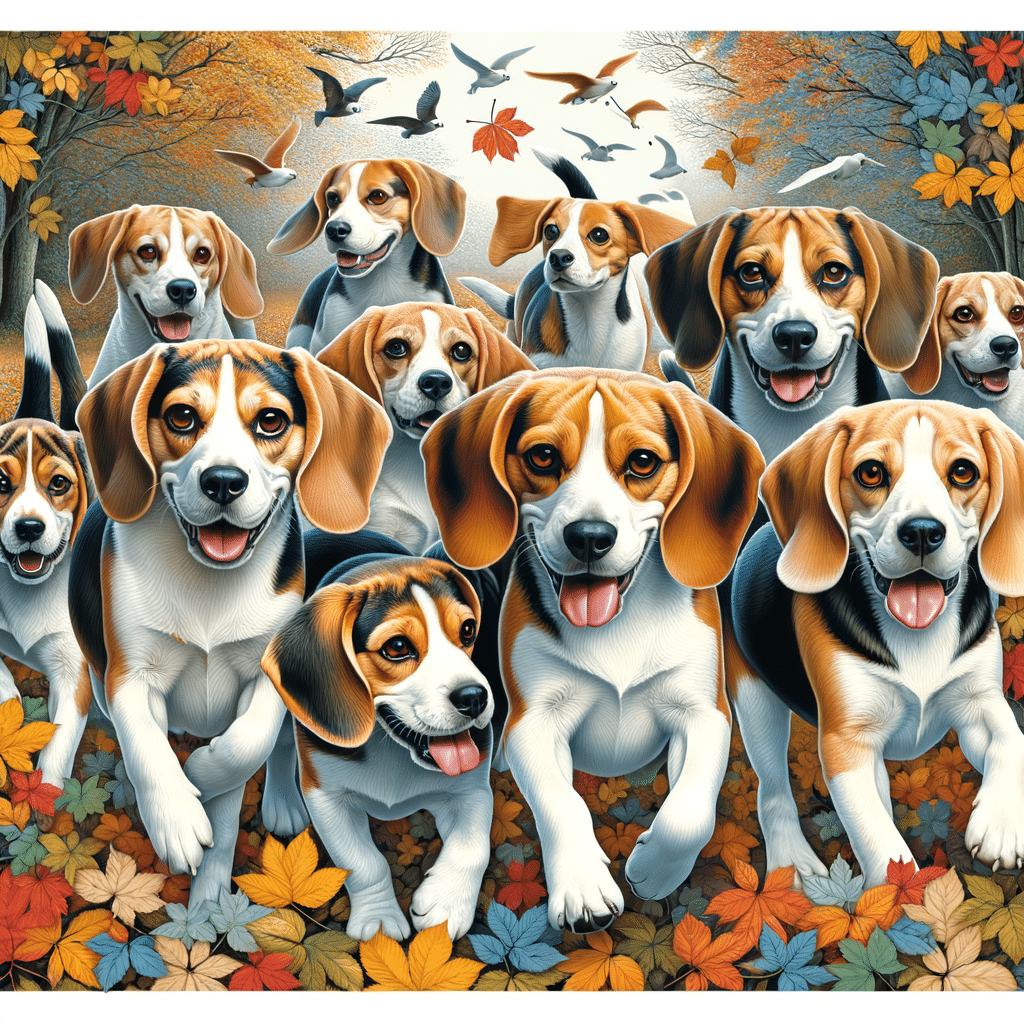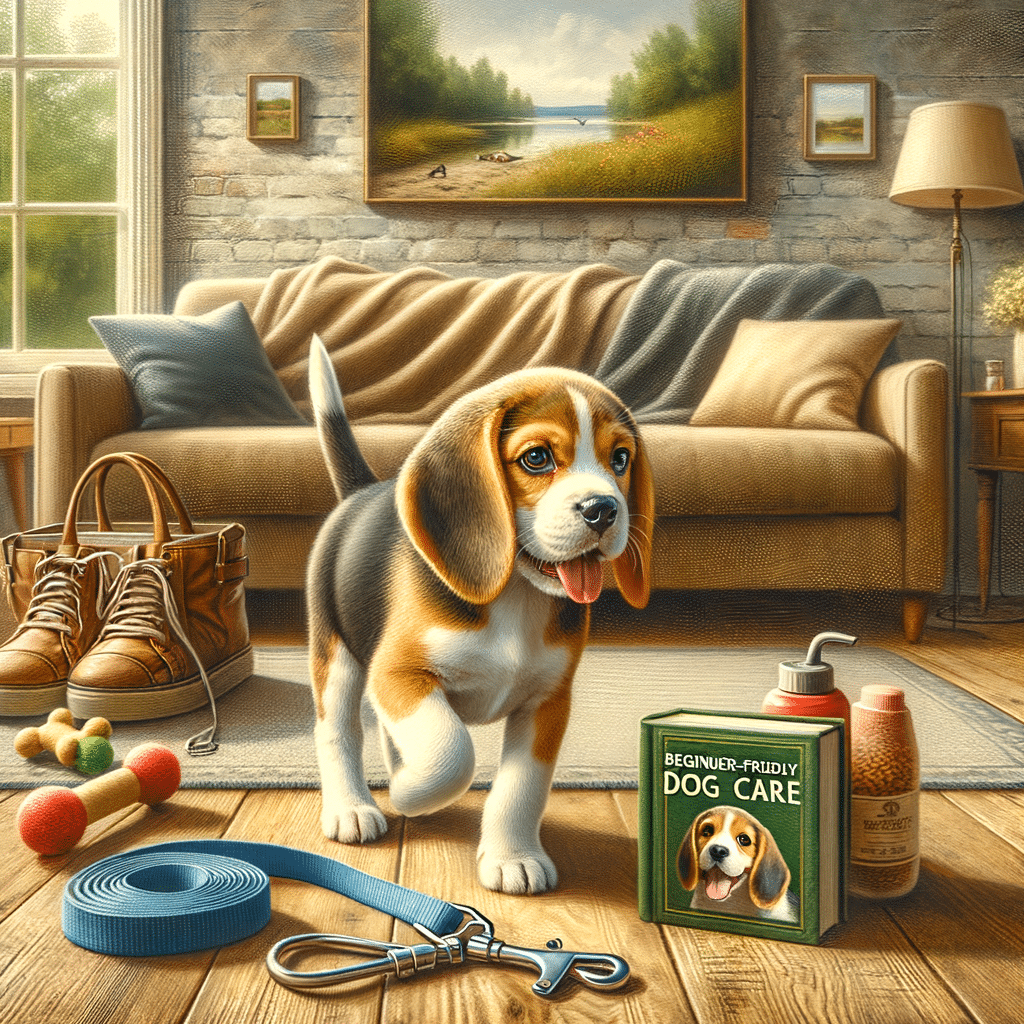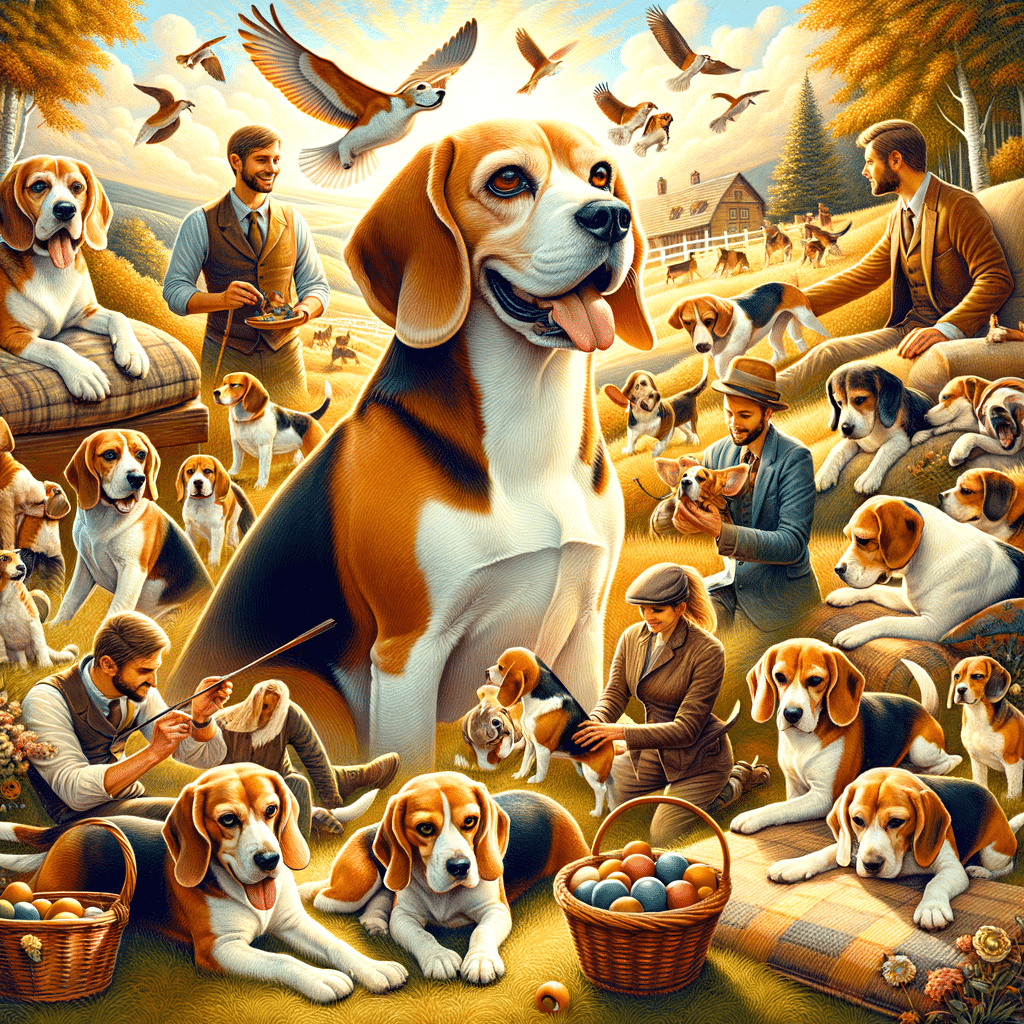While the playful and cheerful nature of the beagle puppy is well-loved by their owners, adult beagles offer a delightful balance of energy and calmness. As they transition into adulthood, typically around 18 months, beagles develop a more predictable and steady behavior.
In This Article
However, they often maintain playfulness and require regular exercise to satisfy their instincts. Understanding an adult beagle’s personality traits is critical for dog owners to nurture a happy and well-behaved companion.
Adult beagles exhibit a unique combination of traits. They are known for their curiosity, intelligence, and amiable personality, making them an exceptional breed for families and individuals alike. Beagles thrive on companionship and can develop strong bonds with their dog owners.
Responsible ownership during this life stage involves continual socialization, ongoing beagle training to reinforce good behavior, and attentive care to meet their physical and emotional needs. Regular vet checkups are also crucial to address any health concerns promptly as adult beagles age.
Highlights
- Adult beagles balance energy with composure, retaining some youthful playfulness.
- Their friendly and curious personalities make them great companions.
- Continuous training and proper health care are essential for their well-being.
Understanding Adult Beagle Behavior
When considering adult beagle behavior, owners should focus on their communication style, the need for regular exercise, and their social habits. Adult beagles retain traits of being energetic and playful. Yet, they require consistent mental stimulation and engagement with their family and other older dog types.
Communication and Vocalization
Adult beagles are expressive dogs and use a range of sounds to communicate. They are known for their distinctive bark and howling, often used to alert or when they seek attention. Dog owners should understand the following vocal behaviors:
- Barking: A beagle's bark is usually loud and can be a response to specific stimuli or a way to express excitement.
- Howling: They may howl alone or join in with other noises, a behavior linking to their hunting heritage.
Exercise and Playfulness
Beagles are naturally energetic and require regular exercise to maintain their health and happiness. Regular physical activity should include:
- Daily Walks: At least one walk daily to manage their energy levels.
- Playtime: Interactive games that stimulate their mind, including fetch and hide-and-seek with treats.
Lack of sufficient exercise can lead to destructive behavior due to their pent-up energy.
Socialization and Companionship
Social interaction is crucial for an adult dog’s well-being. They are affectionate and thrive on companionship.
- Socializing with other dogs: Helps to keep them mentally stimulated and prevents behavioral issues.
- Affection towards family: They often seek love and attention from their human family, demonstrating loyalty and affection.
Regular engagement with people and pets is essential to satisfy their social needs. This includes family interactions and structured playdates with other dogs.
Health and Wellness
Maintaining optimal health and wellness is vital for an adult beagle. This breed faces particular health challenges but thrives with proper nutrition, regular exercise, and vigilant care against common ailments.
Common Health Issues
Beagle pups generally have a life expectancy of 12 to 15 years but are predisposed to specific health conditions. Seizures can be a concern, often linked to epilepsy, which requires medical management. They are also prone to allergies that can manifest as skin conditions. Ear infections are common due to their long ears; maintaining ear hygiene is paramount.
Cherry eye, a condition where the gland under the eyelid protrudes, can occur, sometimes necessitating surgical correction. Beagles may develop cancer, although it is less prevalent in this breed than in others. Preventive measures, such as spaying or neutering, can mitigate risks for certain types of cancers.
Nutrition and Diet
Proper feeding is crucial for their beagle health. The ideal diet should consist of:
- High-quality dog food tailored for small to medium breeds.
- Balanced nutrients, rich in protein, with moderate carbohydrates and fats.
- An array of antioxidants and vitamins to support immune health.
It’s essential to measure their food and manage treats to prevent obesity, a common concern for this breed. Obesity can exacerbate joint issues and cause a host of other health problems.
Exercise Routine
Beagles possess significant energy and require an appropriate exercise routine to maintain physical and mental wellness. They benefit from:
- At least 1 hour of exercise daily can be split between walks, play sessions, and mentally stimulating activities.
- Activities that cater to their strong sense of smell, like scent games.
- Opportunities to socialize with other adult dogs and humans to fulfill their pack-oriented nature.
Regular exercise not only curbs obesity but also helps to mitigate potential behavioral issues.
Effective Training Strategies
When training an adult dog, it’s essential to focus on techniques that emphasize consistency and patience. Adult beagles respond well to clarity in commands and routines, making a well-thought-out approach necessary for practical training.
Positive Reinforcement
Positive reinforcement is a cornerstone of beagle training. This approach involves rewarding desired behaviors and encouraging the dog to repeat them. Rewards can include:
- Praise: Verbal affirmations like "good dog" should be acknowledged when the beagle follows a command correctly.
- Treats: Small morsels of food that act as an immediate tangible reward.
- Toys: Access to a favorite toy can also serve as a reward.
Delivering these rewards promptly is vital to creating a clear association between the behavior and the reward. Consistency in this method helps beagles understand what is expected of them.
Behavior and Discipline
For beagles to learn obedience and discipline, pet owners should:
- Maintain a routine that provides structure; feeding, walking, and training should happen at similar times each day.
- Use commands in a firm but gentle tone. Owners should be patient and expect consistency over time to yield results.
- Incorporate crate training to provide a safe space for the beagle, aiding in house training and reducing anxiety.
Correcting undesirable behaviors should never involve physical punishment. Instead, redirecting the dog’s attention or using an assertive voice helps discipline them from destructive behavior without causing fear or aggression.
Advanced Training Concepts
Beyond basic commands, this dog breed benefits from engaging in more complex activities that stimulate their minds and cater to their instincts, such as:
- Leash training is vital for safe walks; teaching a beagle to walk without pulling requires consistent practice with commands and rewards.
- Puzzle toys and scent games challenge their problem-solving skills and use their superior sense of smell.
These activities reinforce obedience and provide mental stimulation that helps prevent boredom-related behavioral problems. When training adult beagles, sessions must be short and enjoyable to keep the dog’s interest and prevent frustration.
Transitioning Through Life Stages
Understanding beagles’ behavior as they grow is essential for adapting to their changing needs and maintaining a healthy routine throughout each life phase.
From Puppyhood to Maturity
As beagles transition from puppyhood to maturity, typically around one year of age, significant behavioral changes occur. The once highly energetic beagle puppy begins to settle; Their growth rate slows, and while they maintain some playfulness, they exhibit a more mature demeanor. Owners should adapt by providing consistent training to help their beagles understand acceptable behavior and boundaries.
Routine becomes increasingly important during this time. Establishing and adhering to a routine helps beagles feel secure and understand what is expected daily.
Entering Senior Years
During their senior years, generally considered to begin at eight years, beagles often experience a slowdown in activity and may have different care requirements. Their behavior may reflect this change, with a noticeable reduction in energy levels.
It is critical to monitor their health more closely and adjust their diet and exercise to match their slowing metabolism and physical ability.
Owners should maintain a gentle yet engaging routine to help their senior beagles remain active and mentally stimulated while avoiding excess strain on their aging bodies.
Frequently Asked Questions
In addressing the nuanced needs of an adult beagle, several common inquiries arise. This section aims to elucidate the essential care, physical characteristics, and behavioral traits of adult beagles.
How do you properly care for an adult beagle?
Proper care for an adult beagle includes a balanced diet, regular exercise, routine vet checkups, and consistent training. Adult beagles require mental stimulation to prevent boredom and possibly destructive behavior.
What is the typical weight range for a male adult beagle?
The typical weight range for a male adult beagle is between 22 to 24 pounds (10 to 11 kg). This can vary based on diet and activity level.
At what age can you typically expect a beagle to calm down?
A beagle typically shows a calmer demeanor around 2 to 3 years old. However, individual temperaments can cause this age to vary.
Is a beagle considered a high-maintenance breed?
Beagles are not considered a high-maintenance breed. They shed and require regular grooming, but their exercise and training needs are moderate compared to other active breeds.
Are beagles suitable for living in a house environment?
Beagles are suitable for living in a house environment if they have ample space for exercise and stimulation. They thrive on interaction with their family members.
What are the common characteristics of adult beagles?
Adult beagles are known for their friendly and curious nature. They typically display a strong sense of smell and enjoy following scents, which keeps them active and engaged.






